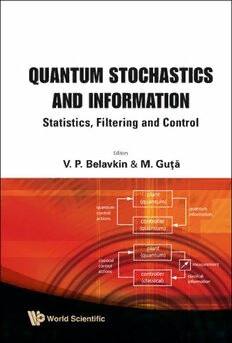Table Of ContentQUANTUM STOCHASTICS
AND INFORMATION
Statistics, Filtering and Control
TThhiiss ppaaggee iinntteennttiioonnaallllyy lleefftt bbllaannkk
QUANTUM STOCHASTICS
AND INFORMATION
Statistics, Filtering and Control
University of Nottingham, UK 15 – 22 July 2006
Editors
V. P. Belavkin
M. Gut¸a˘
University of Nottingham, UK
World Scientiic
NEW JERSEY LONDON SINGAPORE BEIJING SHANGHAI HONG KONG TAIPEI CHENNAI
• • • • • • •
Published by
World Scientific Publishing Co. Pte. Ltd.
5 Toh Tuck Link, Singapore 596224
USA office: 27 Warren Street, Suite 401-402, Hackensack, NJ 07601
UK office: 57 Shelton Street, Covent Garden, London WC2H 9HE
Library of Congress Cataloging-in-Publication Data
Quantum stochastics and information : statistics, filtering, and control : University of Nottingham,
UK, 15–22 July 2006 / edited by V. Belavkin & M. GuÛ|.
p. cm.
Includes index.
ISBN-13: 978-981-283-295-5 (hardcover : alk. paper)
ISBN-10: 981-283-295-5 (hardcover : alk. paper)
1. Quantum statistics--Congresses. 2. Control theory--Congresses. 3. Mathematical physics--
Congresses. I. Belavkin, V. P. II. GuÛ|, M. (Madalin), 1973–
QC174.4.A1Q36 2008
530.13'3--dc22
2008024091
British Library Cataloguing-in-Publication Data
A catalogue record for this book is available from the British Library.
Copyright © 2008 by World Scientific Publishing Co. Pte. Ltd.
All rights reserved. This book, or parts thereof, may not be reproduced in any form or by any means,
electronic or mechanical, including photocopying, recording or any information storage and retrieval
system now known or to be invented, without written permission from the Publisher.
For photocopying of material in this volume, please pay a copying fee through the Copyright
Clearance Center, Inc., 222 Rosewood Drive, Danvers, MA 01923, USA. In this case permission to
photocopy is not required from the publisher.
Printed in Singapore.
v
PREFACE
Quantum Probability was initiated by von Neumann as a new, intrin-
sically probabilistic Hilbert space theory of operator observables. Starting
with the 80’s of the last century the field was greatly enlarged and devel-
oped into a non-commutative analogue of Kolmogorov’s theory of stochas-
tic processes. One of its aims is to clarify the probabilistic foundations of
quantum theory and its statistical interpretation. The basic problems cen-
tre around non-commutative independence (including freeness), quantum
dynamic dependence (entanglement) and quantum stochastic dependence
(non-commutative Markov processes). Quantum Probability is now a het-
erogeneous subject with many connections to other areas of mathematics
andphysics.Onthepuremathematicsside,itinteractswithinfinitedimen-
sionalfunctionalandnon-commutativeharmonicanalysis,operatoralgebra
and operator space theory, non-commutative dynamics, non-commutative
K-theory.
ThefirstresultsonQuantumInformationandQuantumStatisticsdate
back to Stratonovich in the 60’s and Helstrom, Belavkin and Holevo in
the 70’s. In the 80’s Belavkin developed the dynamical theory of Quantum
Feedback Control based on quantum probabilistic foundations. Currently,
these fields enjoy a rapid expansion and have a direct impact on techno-
logical advances in Quantum Physics and Engineering. Significant applica-
tions to physics include quantum metrology, control of quantum networks,
validation of quantum state preparation through statistical inference. The
most recent advances along these lines are based on quantum stochastic
filteringtheoryasapplicationofquantumstochasticcalculus,alldeveloped
in Nottingham and presented in this volume. Quantum filtering describes
the interface of classical events with quantum mechanics in the new Even-
tum Mechanics, the information dynamics based on constructive quantum
stochastic models of the unified quantum-classical mechanics. It gives the
dynamical solution of the long standing quantum measurement problem,
resolving many famous paradoxes of quantum physics.
vi
TheQuantum Probability, Information and Control Symposium wasor-
ganised during July 15-24, 2006 as the reunion of two closely related con-
ferences. Quantum Probability and Applications - QP 27, was the last of
a series of network events of the EU Research Training Network ‘Quantum
Probability and Applications to Physics, Information and Biology’. The
second event was dedicated to Quantum Information, Quantum Statistics,
Filtering and Control - QIC and was supported financially by the London
Mathematical Society and the Engineering and Physical Sciences Research
Council. The 60’s birthday of Professor Belavkin was celebrated in a spe-
cially dedicated session.
This proceedings volume contains a broad and representative selection
of papers on subjects ranging from Quantum Control, Statistics and Prob-
ability,toOperatorAlgebrasandNon-commutativeAnalysis.Theunifying
paradigm is the further integration between well established classical fields
such as Information Theory, Filtering and Control, Statistical Inference,
and their quantum counterparts, using the language of Hilbert space op-
erators and the probabilistic interpretation of quantum mechanics. This
synthesis is catalysed by recent developments and promising applications
in Quantum Engineering.
WethankJohnGough,MartinLindsayandJoachimZachariasfortheir
supportintheorganisationoftheSymposium.Wealsothankthemembers
of the Scientific Committee for their help in drawing up the conference
program.
V.P. Belavkin Nottingham, U.K.
M. Gu¸t˘a 1 May 2008
vii
ORGANIZING COMMITTEES
Scientific Advisory Committee
L. Accardi, S. Albeverio, M. D’Ariano, O. Barndorff-Nielsen, M. Boz˙ejko,
U. Franz, O. Hirota, R.L. Hudson, M. James, A. Khrennikov, H. Maassen,
D. Petz, M. Schu¨rmann, H. Yuen
Local organisers
V.P. Belavkin, J. Gough, M. Gu¸t˘a, M. Lindsay, J. Zacharias
TThhiiss ppaaggee iinntteennttiioonnaallllyy lleefftt bbllaannkk
ix
CONTENTS
Preface v
Organizing Committees vii
Part A Quantum Probability and Analysis 1
ApproximationviaToyFockSpace—TheVacuum-Adapted
Viewpoint 3
A. C. R. Belton
Regular Solutions of Quantum Stochastic Differential Equations 23
F. Fagnola
From Algebraic to Analytic Double Product Integrals 34
R. Hudson
Product Systems; a Survey with Commutants in View 47
M. Skeide
Clifford Algebras, Random Graphs, and Quantum Random Variables 87
R. Schott & G. S. Staples
The Set of Density Operators Modelled on an Orlicz Space 99
R. F. Streater
Quantum Extensions of the Classical Domination Principle 110
V. Umanit`a
Analysis in Operator Spaces 121
B. Zegarlin´ski

